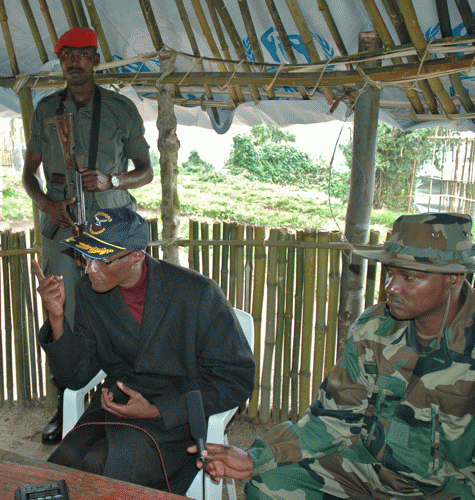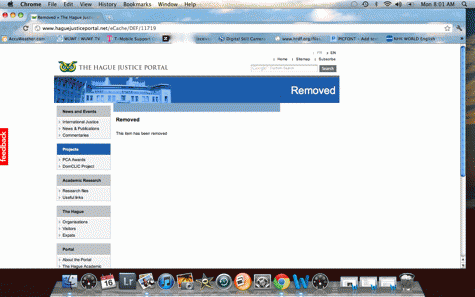"Study history, study history. In history lies all the secrets of statecraft."
~~Winston Churchill
Goma, January 3, 2009
The television in the squalid hotel dining room was tuned to an early morning French newscast. The male commentator was quoting a BBC report that General Laurent Nkunda, head of the CNDP, had been ousted. There was something terribly wrong about the report. Our group had just come from a meeting with Nkunda at his compound near Jomba where he had been very much in control. There was an easy way to confirm that the BBC report was wrong. We called Nkunda on his cell phone.
Nkunda at Jomba 2009 Photo: G. Nienaber
"This is absolutely not true," Nkunda said from his location in north Kivu Province in the Democratic Republic of Congo (DRC). The rival who challenged Nkunda's leadership was CNDP military chief of staff General Bosco Ntaganda, who was wanted by the International Criminal Court (ICC) for war crimes committed in 2002. Nkunda said that Ntaganda had as many as 36 troops with him, but had not staged a successful coup.
The media was reporting a coup that hadn't happened.
This was not the first time that lies formed the basis of statecraft in the case of Laurent Nkunda. Was he a renegade rebel, freedom fighter, dissident, murderer, saint, or savior? Truth, quote unquote, was whatever the international media and factional interests decreed. This template of "truth" was forged in international strategic and military interests in the Great Lakes region, not to mention gold, coltan, tin, diamonds and oil.
China was also silently waiting in the wings for the spoils and Nkunda viewed the Chinese as a threat to his country's heritage and wealth -- a robber baron of the future of Congolese children. In our 2009 discussion during a Virunga thunderstorm at Jomba, shielded from its force by a tattered UNICEF tarp, Nkunda predicted deals between DRC's President, Joseph Kabila, and the Chinese would benefit no one but Kabila.
In fact, by October of 2011 it was Kabila who approved a $6 billion copper-for-infrastructure deal with China that left Congo holding an empty money bag and $5.5 million the worse for the deal. The Economist and the British press commented: "The sale of mining licenses at below-market value to firms associated with friends of the president has raised eyebrows."
In three years, no one has heard from Nkunda after his betrayal by Rwanda's Paul Kagame in a mutually beneficial alliance with Congo's Joseph Kabila. Paul Kagame's press office has not responded to repeated requests for an interview.
Contrary to news reports at the time, Nkunda was not on the run, nor had he been ousted in a coup d'Ã �tat by the war criminal Bosco Ntaganda. Against the advice of advisors, Nkunda went willingly to a meeting called in Rwanda to consider peace talks. Associates suspected a trap, and they were correct. But a "renegade" general "on the run" is a compelling story.
Today, Nkunda is being held under house arrest in Rwanda with no criminal charges pending against him. A petition filed by his lawyer in the Supreme Court of Rwanda in March 2010 says Nkunda:
...was arrested on or about January 22, 2009 by members of Rwanda Defence Forces of Rwanda (RDF), and remains to this day held by the Rwandan authorities, and without appearing before a judge so that he can be informed of the reasons for his arrest and detention....Laurent Nkunda was arrested while attending a formal meeting to which he had been invited to participate...
This document has been recently scrubbed from the ICC website. The Hague has not responded to our request for an explanation. One explanation might be that the complete petition demonstrates that Rwanda is in violation of its constitution, since it holds Nkunda with no criminal or civil charges filed against him.
In late 2008, there was intense international pressure on both Rwanda and Congo to end the bloodshed in eastern Congo. When Rwanda decided to join forces with Joseph Kabila to fight the FDLR, Nkunda refused to join the new alliance. Nkunda, a Tutsi, was providing protection for the Rwandan border and also residents of eastern Congo from the Hutu FDLR, responsible for the 1994 genocide. There was good reason for Kagame to want Nkunda marginalized. He was more popular than the Rwandan president. As far as Kabila was concerned, Nkunda's CNDP was marching almost unopposed towards Kinshasha, and an alliance with the enemy Rwanda was an easy solution to the Nkunda "problem." 21,000 square kilometers were under CNDP control.
One of the most sensational and damaging press reports focused on the massacre at the village Kiwanja in December 2008. The bloodshed was blamed on Nkunda and he vehemently denied any involvement.
(Note: You can view every article as one long page if you sign up as an Advocate Member, or higher).







